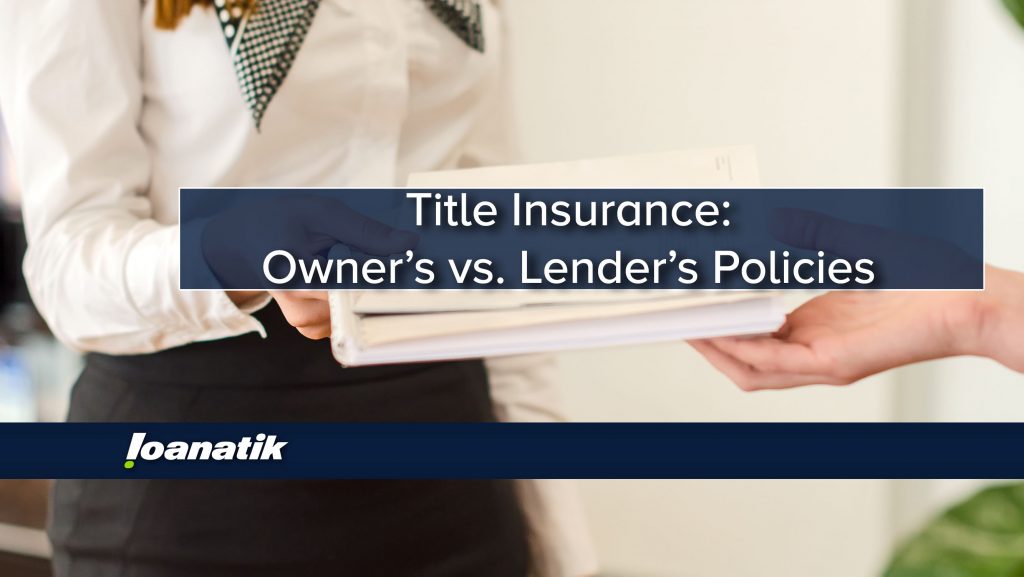Title Insurance: Owner’s vs. Lender’s Policies

For many, title insurance is a murky topic. Homebuyers know that they need it, although they may be uncertain as to why. In this article, we’ll clear up any confusion and explain why there are two types of title insurance.
What Is Title?
Title is the right to occupy and use the space of a property. It’s what proves you have purchased or otherwise taken ownership of a building or land. Buying real estate is a little different than buying, say, a camera. When you go to the store and pay for a camera, you do not have to worry about someone else claiming its ownership. However, real property may be entangled by claims and rights asserted by others. These claims may compromise your ability to use and enjoy your property. The solution to this potential problem is title insurance.
Title Insurance
Title insurance is issued by title companies after they perform title searches. Its purpose is to indemnify the policyholder from financial loss if problems arise regarding a property’s title. What kind of problems? Well, let’s say you buy a nice home in the neighborhood of your choice, not knowing that the local government has put a lien on the property because the owner has not paid property taxes for 12 years. It is the job of the title company to thoroughly research the property you want to buy and insure it is free of claims, liens, disputes and so forth. If the title company issues you a title insurance policy, it will pay any valid title-related claims and resolve any outstanding problems (a process known as “perfecting the title.”)
Title companies go about their jobs by examining various public documents, including federal and state records, deeds, encumbrances, court judgements, tax records and zoning laws. They will even check whether the property is in a flood zone. Title insurance is backward facing: When a title policy is issued, you are protected from the effects of past transactional events, not future events. In other words, it will not protect you if someone puts a lien on the property a day after the closing.
What Title Insurance Isn’t
Do not confuse title insurance with homeowner’s insurance, which is also required by the lender. The latter insures your home and its contents against damage, such as fire, storms, theft, vandalism, etc. In addition, certain non-title issues can come up that you may want to protect against via an enhanced homeowner’s policy. This will cover problems like zoning setback violations, improper subdivisions, and so forth. The only other coverage you may need is flood insurance, which is issued by the federal government and is usually a good deal. Homeowner’s insurance is future-facing: You’re covered as long as you pay your premiums.
Oh yes, if you put down less than 20 percent when you buy your home, your lender will require you to take out mortgage insurance, which partially protects the lender if you default on your payments. Normally, you can drop mortgage insurance once you’ve paid 20 percent of the property’s purchase price.
Lender’s Title Insurance
Unless you pay cash for your home, you’ll have to pay for lender’s title insurance at closing. This insurance covers your lender’s investment in the property, not the total value. This insurance does not protect buyers. Your mortgage lender will not close your loan unless it receives a title policy.
Owner’s Title Insurance
If you want to protect the full value of your property from title claims, you want owner’s title insurance. You have the opportunity to buy this at closing for a one-time premium. Once you have this policy, you and your heirs are perpetually protected from title defects as long as you or they have an interest in the property.
Owner’s title insurance also helps you when you eventually sell your property. If a title issue arises at this time, the policy insures that the sale or refinancing will proceed by offering insurance to the new lender or buyer. The title company will pay for any work required to perfect a title defect, including paying your lawyer’s fees if you end up in court.
By way of illustration, a recent court case in Massachusetts invalidated thousands of titles on properties that were subject to foreclosure because the lenders did follow proper procedures. Under the ruling, someone who bought a house in 2010 that was incorrectly foreclosed 30 years earlier didn’t have valid title and thus would be unable to sell the property. However, if that buyer had purchased owner’s title insurance, the title company would issue an owner’s policy to a new buyer, enabling sale of the property.
The bottom line: Owner’s title insurance can save you tens of thousands of dollars, and at a price of 0.5 percent of the purchase price, is well worth it.





COMMENTS